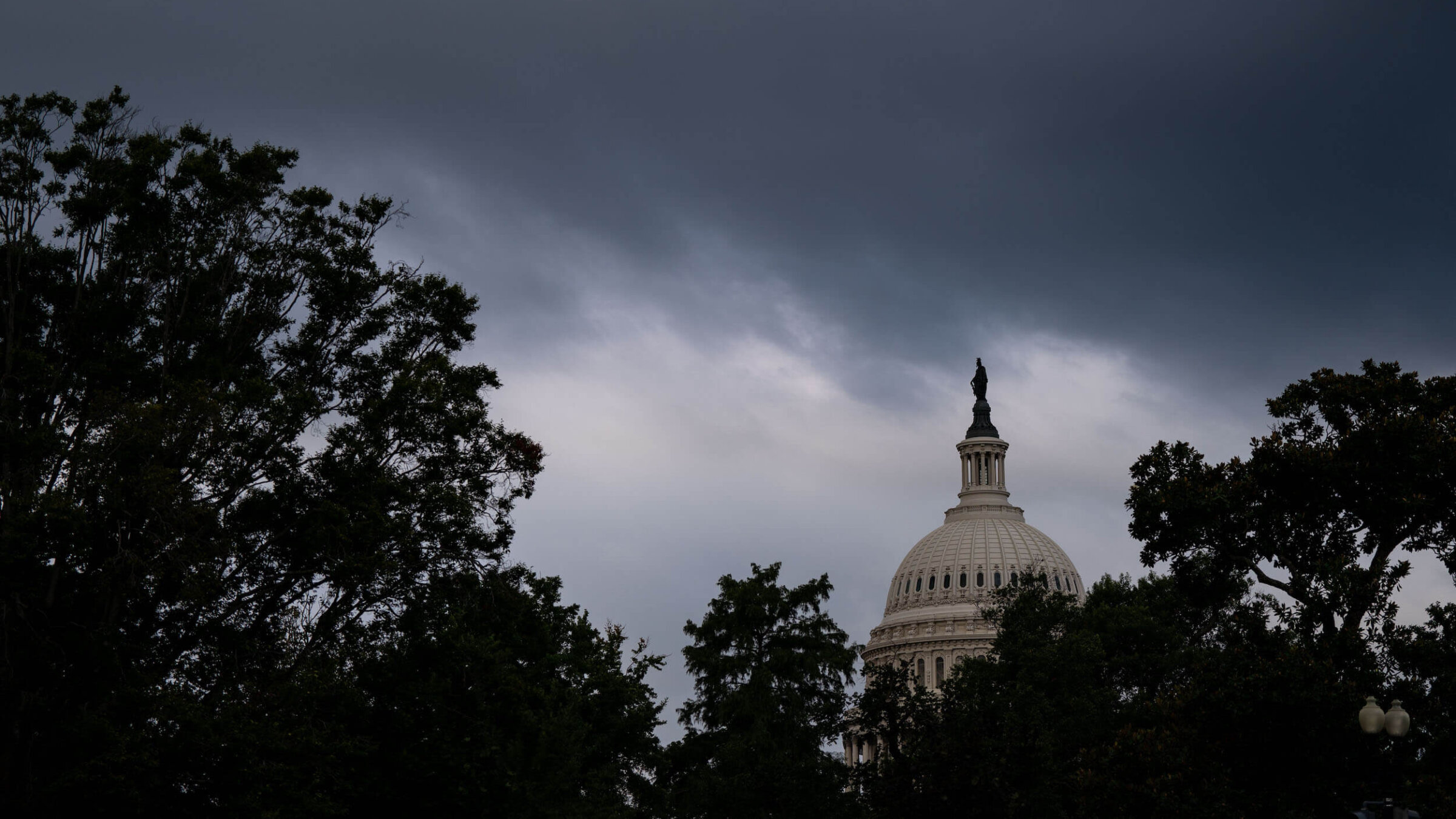Congress is voting on a bill targeting pro-Palestinian groups. Israel’s example proves it’s a terrible idea
H.R. 9495 would open the door for more antidemocratic developments — as laws in Israel have done for 15 years

Dark clouds over the dome of the U.S. Capitol. Photo by Kent Nishimura/Getty Images
The House of Representatives is trying to pass a bill, under the guise of pushing back on terrorism, that would hand President-elect Donald Trump a cudgel with which to attack American civil society organizations.
H.R. 9495 — titled “The Stop Terror-Financing and Tax Penalties on American Hostages Act” — already failed one House vote last week. Its bipartisan cosponsors won’t accept defeat so easily, and are bringing it to another vote on Wednesday. The bill would hand the secretary of the Treasury — who, in just two short months, will be a Trump appointee — the authority to unilaterally revoke the tax-exempt status of any nonprofit they deemed to be a “terrorist supporting organization.” In other words, shut them down.
As the CEO of the New Israel Fund, the premier funder of progressive, pro-human rights and democracy organizations in Israel, I know just how dangerous this measure is. For more than 15 years, progressive Israeli civil society has worked — with the aid of nonprofits like ours — to advance equality, justice and safety for Jews and Palestinians alike, while fending off the kinds of accusations this bill tees up. And after facing endless delegitimization campaigns aimed at painting them as traitorous — not to mention the reams of anti-democratic legislation that Israeli Prime Minister Benjamin Netanyahu and his hardline allies have pushed in an effort to quash their efforts — we know how important it is for Congress to vote down this bill.
Both Trump and Netanyahu know how to use the media, legislation and the threat of brute force to crack down on dissent, but Netanyhau has often been a few steps ahead of Trump and his allies. Israel’s 2016 “NGO transparency Law” could easily have been the inspiration for H.R. 9495. The law, now on the books in Israel, takes aim at organizations that get their funding from governments like those of Germany and the Netherlands, from which most human rights NGOs draw resources. While NGOs that receive private funds — the lifeblood of many right-wing organizations — are completely ignored.
Like H.R. 9495, Israel’s 2016 law was designed mainly to intimidate civil society organizations, and to undermine their legitimacy in the eyes of the Israeli public. Its message is clear: The Israeli left is a legitimate target, because they are the ones who are critical of Israel’s policies and support rights for Palestinians — which, according to right-wing logic, puts them in bed with terrorists. This is, of course, patently absurd.
The next year, Israel’s government passed another law that banned foreign nationals and Palestinians from the West Bank from even entering the state of Israel if they were found to have supported the Boycott, Divestment and Sanctions movement. This law essentially expanded and concretized the message of the 2016 law, which was that supporters of nonviolent pro-Palestinian protest — that is, people with whom the government disagrees — are nearly as dangerous as actual terrorists.
These were the kinds of laws that laid the groundwork for more out-and-out authoritarian legislation and action in Israel, like when the Ministry of Defense summarily shut down six Palestinian civil society organizations in 2021. H.R. 9495 is straight out of the same playbook.
This bill is likely a harbinger of further undemocratic steps to come. Trump and his allies have long sought to delegitimize progressive civil society organizations. Like Netanyahu, Trump routinely labels them as a violent internal threat. Those of us who care about the health of American civil society writ large should worry that laws used to target the movement demanding Palestinian rights in the U.S. — the clear first target of this bill — will ultimately be used to target other dissenters here, too.
Like Israel’s anti-democratic laws, H.R. 9495 is purposefully vague and expansive. If passed, it would offer Trump a legal pathway to potentially target a wide swath of American civil society. The downstream results would chill speech, and the democratic spaces civil society needs to operate. As written, the bill allows the Treasury to rely on secret evidence not provided to the targeted NGO when revoking tax-exempt status. Israel’s example shows how dangerous that is: When the Israeli government stripped those six Palestinian human rights groups of their status, it justified its decision by invoking unsubstantiated “secret dossiers.”
The ultra-conservative authors of Project 2025 and Project Esther — its companion plan, designed to crack down on the Palestinian rights movement in America under the guise of fighting antisemitism — make clear that H.R. 9495 is seen as just the tip of the spear. One need not be an historian of McCarthyism to know where this can lead.
H.R. 9495’s supporters argue that organizations accused of support for terrorism ought to have their tax-exempt status revoked, and only the most radical groups will be affected. But the U.S. already has harsh penalties for individuals and organizations that provide material support for terrorist organizations, and empowers the Department of Justice to investigate such cases. What this piece of legislation would do is strip due process from the system, and enable the administration of a president who has voiced support for suppression of protests and dismissed the Constitution to legally designate any organization as “terrorists.”
Americans do not need this. They do not need to give Trump yet another autocratic weapon with which to endanger American civil society.
Even if I don’t always agree with the organizations likely to be targeted under this bill, I believe in their right to engage in nonviolent advocacy. The next four years will present a challenge to all of us who care about freedom in the U.S., and for the civil society that guards those freedoms. Take it from an organization that has been supporting Israeli civil society for over four decades: We must remain steadfast in defending the right to protest and dissent, because Trump and his lackeys will likely do everything they can to chip away at our resolve.

















